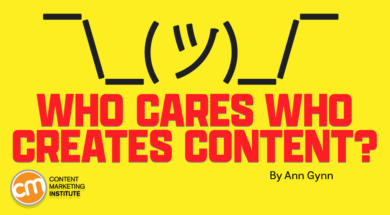Who cares who created the content?
Sure, the person who wrote, recorded, or produced it cares. And probably, their parents do, too (if my personal experience is any indicator.)
And maybe, if the person is a known expert or celebrity in their field, the publisher cares because their involvement will draw more attention.
But for the most part, authorship doesn’t matter. Yet, given the voluminous conversations around generative content AI, you would think it does.
It doesn’t matter who or what created the #content, says @AnnGynn via @CMIContent. #Content Marketing #AI Click To Tweet
Results are what matters
Some argue that AI-produced content is rarely as good as what an experienced human writer could do. Given how many first drafts I see, I’m not sure about that, but let’s assume the premise.
Jess Fortet writes on the Jounce blog, “Human writers bring a level of creativity, emotion, and nuance that AI-generated copy may struggle to replicate. The ability to connect with readers on an emotional level can set human-generated content apart from AI-generated content.”
Yes, humans can bring creativity, emotion, and nuance. But unfortunately, that’s not how many brands assess their content marketing. As Eliyahu M. Goldratt wrote in Critical Chain more than 25 years ago: “Tell me how you measure me, and I will tell you how I will behave.”
Evaluating the success of content marketing revolves around the content’s impact on the buyer’s journey. So that’s what human creators bring to their content marketing. They focus on attributes like keywords, titles, length, meta descriptions, etc. They think about calls to action that will motivate content consumers to take the next step.
Who created the content doesn’t matter in content marketing. What matters is whether the content delivered what the audience and brand wanted. For the audience, that’s information or entertainment. For the brand, that’s clicks and other actions along the buyer’s journey.
Successful #content delivers what the audience and brand want. That isn’t based on who created it, says @AnnGynn via @CMIContent. #Content Marketing #AI Click To Tweet
Doesn’t Google say it cares who created content?
Yes, I know, Google once said AI-generated content goes against its guidelines, so it classified it as spam. But I believed that declaration as well as I did when my teachers warned our class that they could tell if we didn’t read the book or just used CliffsNotes. (Based on my grades, I disagreed, though I didn’t tell them that.)
Earlier this year, Google clarified its guidance: “Using automation – including AI – to generate content with the primary purpose of manipulating ranking in search results is a violation of our spam policies.”
But Google recognizes not all automation, including AI generation, is spam. “AI has the ability to power new levels of expression and creativity, and to serve as a critical tool to help people create great content for the web,” it writes.
Frankly, I’m not sure how great AI-created content really needs to be. After all, consider how long content farms or mills have existed. Those high-producing, low-paying factories certainly wouldn’t have been in long business if their content didn’t deliver search-focused results.
Thus, if the content delivers on the basics of Google’s EEAT guidelines – experience, expertise, authoritativeness, and trustworthiness, Google will deliver it to searchers.
AI transparency is not a necessity
Some argue if you publish AI-generated content, you should disclose that to the audience.
As a copyright issue, I get it. The US Copyright Office has issued opinions on AI-generated content, noting only human-created content can have copyright protections.
But audiences don’t require content-creation transparency. If they did, then why hasn’t it been the publishing norm for hundreds, if not thousands, of years?
Early in my career, I was the city editor at a daily newspaper when I saw a pile of clips and a portfolio case in the back window of a reporter’s car. (Yes, it was so long ago that the articles were actually cut from newspapers and put in a physical vessel.)
I chuckled quietly. The reporter recognized good content, but she didn’t know how to write it. All the articles she planned to feature in her portfolio were heavily – and I mean heavily – edited. But her byline was the only name that appeared.
Did the newspaper’s readers care? No, though, whoever considered hiring her did.
If readers really cared about who created the #content, the publisher would name the author, editor, copy editor, etc., says @AnnGynn via @CMIContent. #Content Marketing #AI Click To Tweet
Before CMI publishes a guest article, at least five people – the original writer, the reviewer who accepted it, the editor, the production person, and the proofreader – and an AI grammar tool touch it. (And that doesn’t count anyone who helped the writer before they submitted it.)
Yet only one person’s name appears on the page. Do you care? Probably not. You just want an interesting, easy-to-understand article that helps your content marketing.
If publishers don’t list the editors, headline writers, copy editors, etc., who help shape the content, they don’t need to disclose if AI generated the content.
Your audience just wants good content
Stop debating – or reading the debates – about who creates the content. It’s a waste of time. Instead, spend a minute revisiting the very definition of content marketing to remind yourself of the most important who:
Content marketing is a strategic marketing approach focused on creating and distributing valuable, relevant, and consistent content to attract and retain a clearly defined audience — and, ultimately, to drive profitable customer action.
The “who” who matters most is the audience. And the content? No matter how it’s created, it must deliver value to that audience.
HANDPICKED RELATED CONTENT:
Cover image by Joseph Kalinowski/Content Marketing Institute
.
Follow us on Facebook | Twitter | YouTube
WPAP (697)


